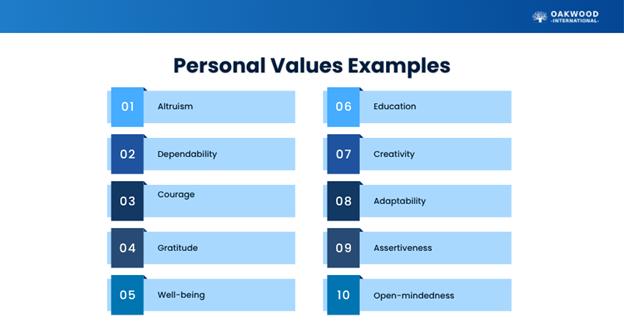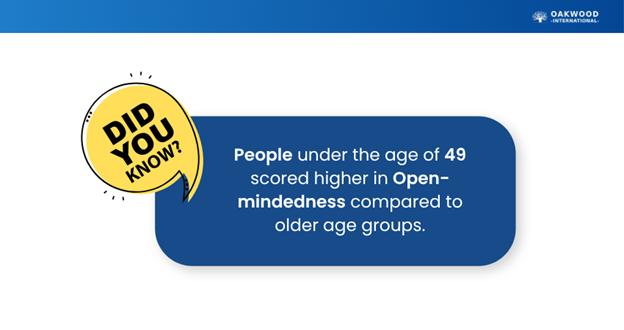Table of Contents


Have you ever wondered why some people always seem calm, confident, and clear about their goals? The answer often lies in their Personal Values, the core beliefs that guide how they live, work, and make decisions. These values act like an inner compass, helping you stay grounded, focused, and true to yourself, even when life feels uncertain.
In this blog, we’ll explore 25 inspiring Personal Values Examples including honesty, compassion, adaptability, and creativity and show you simple ways to identify and strengthen your own values for a more balanced, meaningful, and fulfilling life.
Table of Contents
1) Why are Personal Values Important?
2) 25 Personal Values Examples to Guide Your Decisions
3) Altruism
4) Dependability
5) Courage
6) Gratitude
7) Well-being
8) Education
9) Creativity
10) Adaptability
11) Assertiveness
12) Open-mindedness
13) How to Develop Your Personal Values?
14) Conclusion
Why are Personal Values Important?
Personal values are important because they show what matters most to you. They guide your choices, help you tell right from wrong, and keep you focused on what truly makes you happy. When you know your values, you make better decisions and feel more confident about them. Even in difficult times, your values remind you of who you are and what you stand for.
In simple terms, personal values help you live with purpose, build strong relationships, and lead a balanced, meaningful life. They give your actions direction and your life a deeper sense of meaning.
25 Personal Values Examples to Guide Your Decisions
Below are 25 Personal Values that many people use as their moral and emotional compass. You may not relate to all of them, but reading through will help you identify the ones that matter most to you. These are the examples of Personal Values:

1) Altruism
Altruism means caring for others without expecting anything in return. It’s about being selfless, helping people simply because you want to make their lives better. Volunteering, donating, or supporting a friend in need are all acts of altruism.
2) Dependability
Being dependable means people can rely on you. Whether it’s showing up on time, finishing work when promised, or keeping a secret, dependability builds trust and strengthens your reputation.
3) Courage
Courage is not about being fearless; it’s about facing your fears and doing the right thing even when it’s difficult. It could mean speaking up for yourself, trying something new or standing by your beliefs.
4) Gratitude
Gratitude means being thankful for what you have, rather than focusing on what’s missing. It encourages positivity and makes you appreciate small joys in life. Practising gratitude daily can improve your mood and relationships.
5) Well-being
This value focuses on your physical, mental, and emotional health. When you value well-being, you make choices that support a balanced and healthy lifestyle, like getting enough sleep, eating well and managing stress.
6) Education
Education isn’t only about school or degrees. It’s about continuous learning, reading, exploring, and staying curious. Valuing education helps you grow personally and professionally throughout life.
7) Creativity
Creativity allows you to express yourself in new and unique ways. It can show up in art, problem-solving, writing or simply thinking differently. When you value creativity, you enjoy exploring ideas and bringing imagination into your work or hobbies.
8) Adaptability
Life changes constantly. Adaptability helps you stay flexible and adjust when things don’t go as planned. People who value adaptability stay calm and find solutions, even in uncertain times. It allows you to grow through challenges and turn unexpected situations into new opportunities.
9) Assertiveness
Assertiveness means expressing your thoughts and feelings clearly and respectfully. It’s about standing up for yourself without being rude or aggressive. This value builds confidence and improves communication.
10) Open-mindedness
Open-mindedness means being willing to listen to different ideas, cultures, or opinions. It helps you learn more, judge less and build stronger, more respectful relationships. This value also encourages growth by helping you adapt to new experiences and viewpoints.

11) Frugality
Frugality means using resources wisely, whether it’s money, time or materials. People who value frugality avoid waste and make thoughtful choices about spending or consumption, leading to a simpler, more sustainable life.
12) Authenticity
Authenticity means being true to yourself. It’s about living honestly and not pretending to be someone else. When you value authenticity, your actions match your beliefs, and people respect your honesty.
Advance your HR leadership with our CIPD Level 7 Advanced Diploma in Strategic People Management – Join now!
13) Self-reflection
Self-reflection is the habit of looking inward to understand your feelings, actions, and decisions. When you take time to reflect, learn from your mistakes and grow into a best version of yourself.
14) Integrity
Integrity means doing what’s right even when no one is watching. It combines honesty, fairness and responsibility. People with integrity are trustworthy and consistent in their words and actions.
15) Compassion
Compassion is about feeling empathy for others and wanting to ease their pain. Whether it’s comforting a friend or helping someone in need, compassion strengthens human connections and creates a kinder, more supportive world.
16) Responsibility
Responsibility means owning your actions and commitments. It’s about being reliable, accountable and doing what needs to be done, whether at home, work or in your community. This value builds trust and shows others they can depend on you.
17) Growth
The value of growth is about improving yourself, learning new skills, overcoming weaknesses, and striving to be better every day. It pushes you to step out of your comfort zone and unlock your full potential.
18) Respect
Respect means recognising the worth of others and treating them with kindness. It includes listening, valuing opinions, and accepting differences. Respect builds stronger and more peaceful relationships.
19) Fairness
Fairness means treating everyone equally and making decisions without bias. People who value fairness stand for justice and equality in all areas of life. It helps create trust, harmony and a sense of balance in relationships and communities.
20) Generosity
Generosity is about giving time, effort, or resources to others without expecting anything in return. Even small acts of kindness can create a big impact in someone’s life and inspire others to spread kindness too.
21) Accountability
Accountability means taking ownership of your actions and being honest about your results. It’s about admitting mistakes, fixing them and learning from them. This value builds trust and helps you grow both personally and professionally.
22) Loyalty
Loyalty means staying faithful to people, causes, or values you care about. Whether it’s supporting a friend, partner or workplace, loyalty builds long-lasting trust and strengthens the bonds that hold relationships together.
23) Self-discipline
Self-discipline helps you stay focused and control your impulses. It’s about doing what’s necessary even when you don’t feel like it. This value helps you achieve long-term goals and builds consistency in your daily habits.
24) Kindness
Kindness means treating others with warmth and care. It’s one of the simplest yet most powerful values that can improve relationships and spread positivity wherever you go. A small act of kindness can lighten up someone’s day and create lasting goodwill.
25) Justice
Justice means standing up for what’s right and ensuring fairness for everyone. When you value justice, you support equality, honesty and ethical behaviour in society. It inspires integrity and helps create a more balanced, respectful world.
Grow your people management skills. Join our CIPD Level 5 Associate Diploma in People Management today!
How to Develop Your Personal Values?
Developing Personal Values takes time, patience, and self-awareness. It’s not something that happens overnight; it’s a process of reflection, choice and action. Here are some steps to help you discover and strengthen your values.
1) Ask Yourself Some Big Questions
Start by thinking deeply about what truly matters to you.
Ask Yourself:
1) What makes me feel proud or fulfilled?
2) What do I want to stand for in life?
3) When do I feel happiest or most comfortable with myself?
4) Your answers will help you see patterns, the things that guide your emotions and decisions. For example, if helping others makes you happy, compassion or service might be one of your core values.
2) Identify your top Priorities
You may appreciate many values, but not all will be equally important. List down the ones that resonate with you and then narrow them to five or six top values.
Ask Yourself:
1) Which values do I want to guide my daily actions?
2) Which values define who I am, not just who I want to be?
3) Focusing on your top priorities helps you live with more clarity and avoid feeling overwhelmed.
3) Write Down Your Core Values
Putting your values into words gives them power. Write them somewhere you can see them, in your journal, on your phone, or even on a vision board.
For Example:
1) “I value honesty, so I’ll always tell the truth, even if it’s uncomfortable.”
2) “I value growth, so I’ll keep learning something new every month.”
3) Writing your values reminds you to stay committed and act with purpose.
4) Develop an Action Plan
Values mean little without action. Once you’ve identified your top ones, plan small steps to practise them in real life.
For Example:
1) If you value kindness, help a neighbour or compliment a colleague.
2) If you value discipline, set a morning routine and stick to it.
3) If you value education, take an online course or read 10 pages daily.
4) Small consistent actions build habits that align with your values.
5) Continuously Review and Refine Your Values
As you grow, your priorities may change, and that’s okay. Review your values every few months to see if they still fit your life goals.
Ask Yourself:
1) Are my actions reflecting my values?
2) Have any new values become important to me?
3) What can I do better to live by my principles?
4) Updating your values keeps you aligned with your personal growth and changing circumstances.
Conclusion
Personal Values guide your thoughts, actions, and relationships, helping you stay true to who you are. By understanding and practising key Personal Values Examples like honesty, kindness, and respect, you can make better decisions, build stronger connections, and create a more meaningful life filled with confidence, balance, and inner peace.
Build a strong foundation in HR and learning with our CIPD Qualification Training – Join now!


 Back
Back



 Back to Catagories
Back to Catagories





 + 44 7452 122728
+ 44 7452 122728










